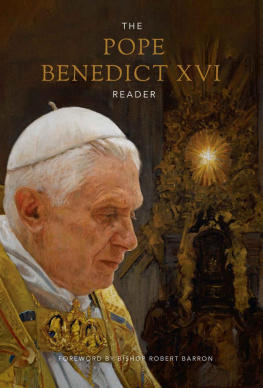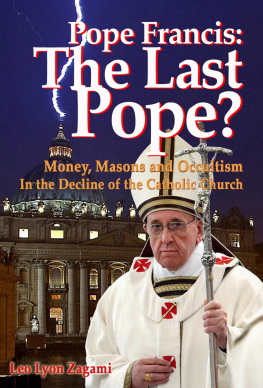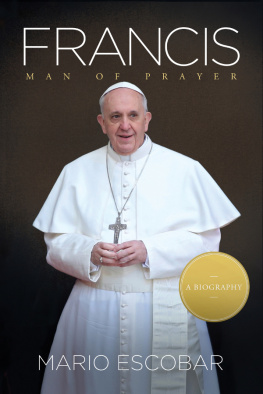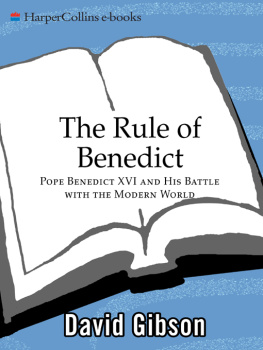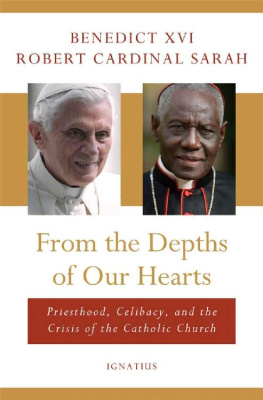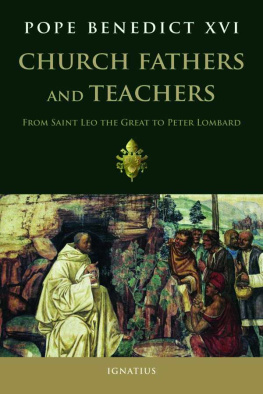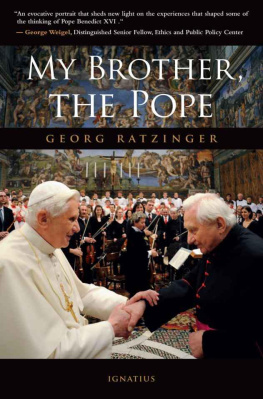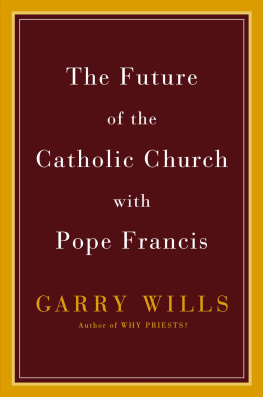john L. Allen - The Rise of Benedict XVI: The Inside Story of How the Pope was Elected and Where He Will Take the Catholic Church
Here you can read online john L. Allen - The Rise of Benedict XVI: The Inside Story of How the Pope was Elected and Where He Will Take the Catholic Church full text of the book (entire story) in english for free. Download pdf and epub, get meaning, cover and reviews about this ebook. year: 2007, publisher: The Crown Publishing Group, genre: Detective and thriller. Description of the work, (preface) as well as reviews are available. Best literature library LitArk.com created for fans of good reading and offers a wide selection of genres:
Romance novel
Science fiction
Adventure
Detective
Science
History
Home and family
Prose
Art
Politics
Computer
Non-fiction
Religion
Business
Children
Humor
Choose a favorite category and find really read worthwhile books. Enjoy immersion in the world of imagination, feel the emotions of the characters or learn something new for yourself, make an fascinating discovery.

- Book:The Rise of Benedict XVI: The Inside Story of How the Pope was Elected and Where He Will Take the Catholic Church
- Author:
- Publisher:The Crown Publishing Group
- Genre:
- Year:2007
- Rating:5 / 5
- Favourites:Add to favourites
- Your mark:
- 100
- 1
- 2
- 3
- 4
- 5
The Rise of Benedict XVI: The Inside Story of How the Pope was Elected and Where He Will Take the Catholic Church: summary, description and annotation
We offer to read an annotation, description, summary or preface (depends on what the author of the book "The Rise of Benedict XVI: The Inside Story of How the Pope was Elected and Where He Will Take the Catholic Church" wrote himself). If you haven't found the necessary information about the book — write in the comments, we will try to find it.
The Rise of Benedict XVI: The Inside Story of How the Pope was Elected and Where He Will Take the Catholic Church — read online for free the complete book (whole text) full work
Below is the text of the book, divided by pages. System saving the place of the last page read, allows you to conveniently read the book "The Rise of Benedict XVI: The Inside Story of How the Pope was Elected and Where He Will Take the Catholic Church" online for free, without having to search again every time where you left off. Put a bookmark, and you can go to the page where you finished reading at any time.
Font size:
Interval:
Bookmark:
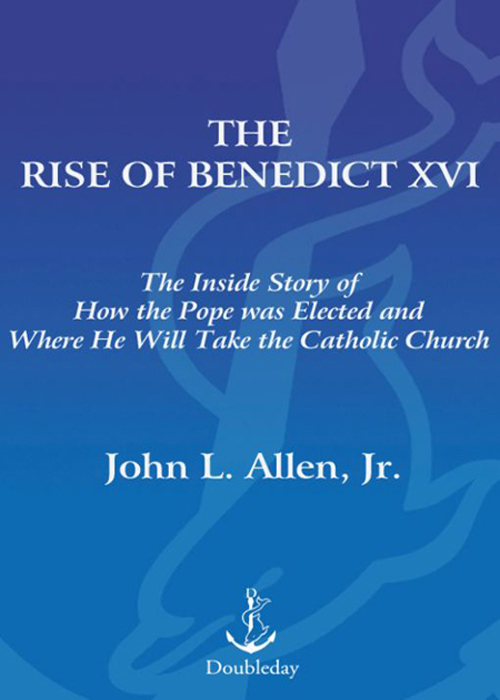

Table of Contents
PREFACE
Politics, it is often said, is the art of compromise. Because elections involve the clash of different interests, victory usually belongs to the candidate who can offer something to everyone, negotiating between competing visions and desires. The winning candidate is generally the one who seems most likely to appeal to all constituencies, or, at a minimum, to be the least disappointing to the majority. Political rhetoric is crafted with this in mind, offering a mixture of platitudes and banalities whose main aim seems to be to offend the fewest listeners possible.
Sometimes, however, the electorate is not in the mood to compromise. Sometimes, with an important historical crossroads looming in front of them, voters opt for a bold choice rather than a least common denominator.
Such was the humor of the College of Cardinals of the Roman Catholic Church in April 2005, when it gathered to elect a successor to Pope John Paul II. Faced with a slew of potential compromise candidates, the cardinals opted instead for a clear, resounding choice, entrusting the Keys of the Kingdom, which Catholics believe were promised by Christ to St. Peter, to seventy-eight-year-old Cardinal Joseph Ratzinger, a man whose resolute views on the challenges facing the Church and the broader culture could not be more unambiguous.
Pope Benedict XVI is a man of epic ambition who hopes to do nothing less than challenge four centuries of intellectual development in the West toward subjectivity and relativism, producing what European intellectuals who share his view call a climate of weak thought. Like St. Benedict fifteen centuries before, from whom the new pope took his name, Benedict XVI aims to inspire alternative models of Christian existence for a culture that, he believes, is too often in denial about the real meaning and purpose of human existence. Benedict is convinced, in a way that has to be nuanced in order to be understood, that there is a historical parallel between the collapse of the Roman Empire and the slide into the Dark Ages, and the era in which we live. Benedict XVI is too sophisticated to launch a crude jihad against secularism, but his pontificate will, nevertheless, be a tough, demanding one, and those who elected him certainly knew that. He will challenge the world to recover confidence in the power of the human intellect to find truth, and the moral and spiritual capacity of men and women to order their lives in the light of that truth. He will do so joyfully, in a spirit of service rather than power, but he will be uncompromising and crystal clear.
There are few jobs on earth more complex, and more consequential, than serving as the Supreme Pontiff of the 1.1 billion-strong Roman Catholic Church. The election of a pope is not just a colorful ritual cloaked in centuries-old mystery and romance, but the naming of an important global leader whose policies touch the lives not just of Catholics, but people of all faiths and of none. Try as one might, a pope cannot be ignored. Religion stirs the deepest passions of the human soul, so that a pope has the capacity to shape not just peoples voting patterns or ideological self-interest, but their dreams and the best versions of themselves. The pope is a moral compass, a voice of conscience, and a cartographer of the soul, and because of all this, the pope is inevitably a major political force. A handful of other religious figures play a similar role, but none so prominently or so influentially as the head of the Roman Catholic Church. To put the point bluntly, a pope matters.
For Catholics, the pope is believed to be the Vicar of Christ on earth, the successor of St. Peter as the chief shepherd of the Christian community. Before all else, therefore, he is supposed to be a man of exemplary holiness, someone who can radiate a sense of Gods love and the power of redemption, someone who can inspire and challenge and console, someone who can do all this while also governing and correcting members of the flock when they stray. It is, in many ways, an impossible and thankless job, imposing a bewildering cluster of demandsthe mastering of any one of which would be a lifes work.
All this went into the reflections of the members of the College of Cardinals, 115 of them under eighty years of age and healthy enough to participate, who arrived in Rome in April 2005 to face the daunting task of electing a new pope. Moreover, they were not just electing any new pontiff, but the successor to John Paul II, a titan who cut across his times in a way few popes of any era ever have. To invoke a tired clich, John Paul II would be a very hard act to follow, and the cardinals knew they had to consider this choice carefully. Most cardinals who were already in their late sixties and seventies were also aware that they would likely have only one opportunity in their lifetime to cast a ballot for a pope, and so the responsibility wore even more heavily.
Catholics believe that the selection of the pope unfolds under the guidance of the Holy Spirit, so that it is not, in the first place, a political exercise but a process of spiritual discernment rooted in prayer. This idea was summed up on the eve of the conclave by the smiling, cheerful Cardinal Ennio Antonelli of Florence, considered by some to be a candidate himself, who said that God already knew who the new pope was, so it was simply up to the cardinals to figure out what God had already decided. Many longtime Vatican-watchers regarded the comment as pious sermonizing, but listening to cardinals after the fact, many seemed to have really experienced the process this way. At least some cardinals perceived a clash between their prayer and their politics; in their heart of hearts, many saw Joseph Ratzinger as the right man for the job, but worried that in some sectors of opinion, especially in western Europe and the United States, he might bring too much baggage because of twenty-four difficult, controversial years as the Churchs top doctrinal watchdog. In the end, most voted their conscience rather than their fear, trying to be faithful to their vow, uttered aloud below Michelangelos intimidating fresco of the Last Judgment during each round of balloting: I call as my witness Christ the Lord, who will be my judge, that my vote is given to the one who before God I think should be elected.
In doing so, many of the cardinals no doubt heard the words of John Pauls last poem, Roman Tryptych, echoing in their memories. Meditating on the conclave that would elect his successor, the late Pope had written: It is necessary that during the conclave, Michelangelo teach them... Michelangelos vision must teach them. The idea was that the cardinals should be thinking not about political or careerist consequences when they cast their ballots, but the moment of judgment in the next life when they will have to account for their choice before God.
Whether Godor historywill eventually judge their choice to have been the correct one remains to be seen. At this stage the pontificate of Benedict XVI is very much an open book, the chapters of which are waiting to be written. Given the character of the man, however, the one thing we can say with certainty about the 265th papacy of the Roman Catholic Church is that it will not be dull. Dramatic, fascinating days lie ahead.
In electing Joseph Ratzinger, the cardinals managed to shatter several bits of conventional wisdom about conclaves: that he who goes in a pope, comes out a cardinal (now false in three of the last six papal elections); that someone too closely identified with the policies of the previous pope is usually not chosen; that the 76 percent of cardinals who come from dioceses around the world would not vote for a member of the Roman Curia; that the cardinals would not want to elect someone from Europe, where the faith is flagging; that seventy-eight years of age is too old to begin so awesome a ministry; that Ratzinger had been in power too long, made too many enemies as well as friends, to put together a two-thirds majority. All these handicapping tips turned out, at least this time around, to be hogwash. In addition, the widely held belief that the Italians would gang up to ensure that the papacy came back home also proved unfounded. In fact, several non-Italian cardinals said that their Italian colleagues by and large approached the election objectively, concentrating on the person rather than the passport he happened to hold. For the most part, conventional political logic gave way to a genuine sense that Ratzinger was the most qualified and best prepared candidate, regardless of age, nationality, or career path.
Next pageFont size:
Interval:
Bookmark:
Similar books «The Rise of Benedict XVI: The Inside Story of How the Pope was Elected and Where He Will Take the Catholic Church»
Look at similar books to The Rise of Benedict XVI: The Inside Story of How the Pope was Elected and Where He Will Take the Catholic Church. We have selected literature similar in name and meaning in the hope of providing readers with more options to find new, interesting, not yet read works.
Discussion, reviews of the book The Rise of Benedict XVI: The Inside Story of How the Pope was Elected and Where He Will Take the Catholic Church and just readers' own opinions. Leave your comments, write what you think about the work, its meaning or the main characters. Specify what exactly you liked and what you didn't like, and why you think so.

